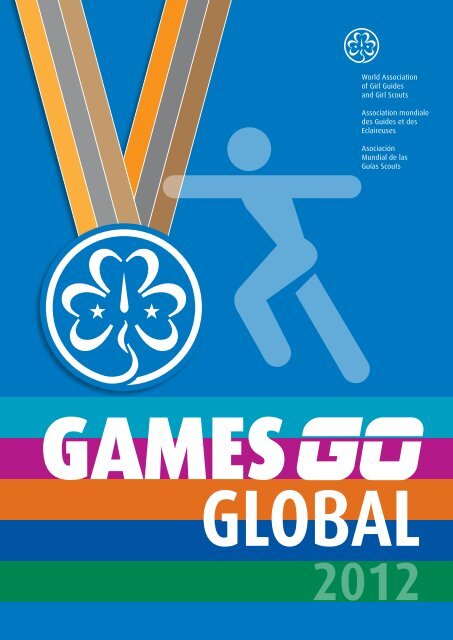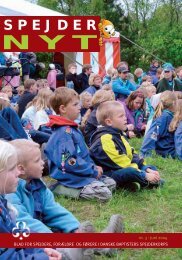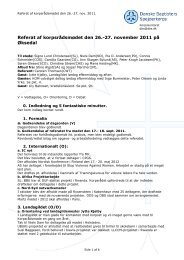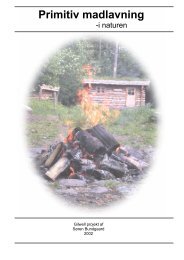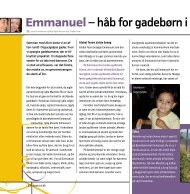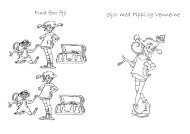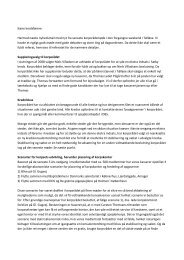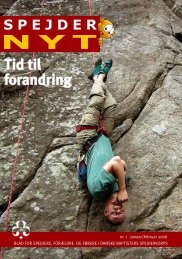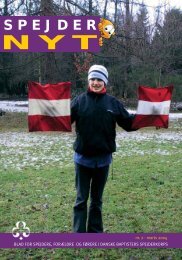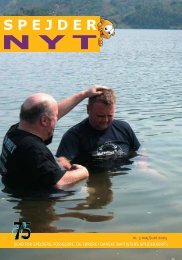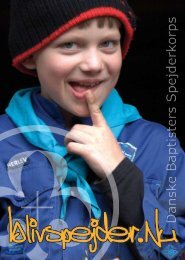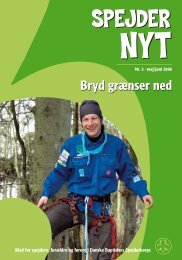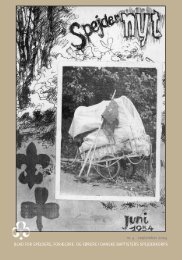Wagggs games - World Association of Girl Guides and Girl Scouts
Wagggs games - World Association of Girl Guides and Girl Scouts
Wagggs games - World Association of Girl Guides and Girl Scouts
Create successful ePaper yourself
Turn your PDF publications into a flip-book with our unique Google optimized e-Paper software.
2012
Games Go Global 2012
Get Ready<br />
Introduction .........................................................................................................................01<br />
The History <strong>of</strong> the Olympic Games......................................................................................02<br />
The Paralympics...................................................................................................................02<br />
The Games Go Global badge...............................................................................................03<br />
Guidelines for Leaders.........................................................................................................04<br />
Get Set<br />
GO!<br />
Warm Up Activities...............................................................................................................05<br />
Activities Part One – Stadium..............................................................................................08<br />
2012 Olympic Sports............................................................................................................11<br />
Activities Part Two – Temple................................................................................................12<br />
2012 Paralympic Sports.......................................................................................................16<br />
Activities Part Three – Theatre.............................................................................................17<br />
Forms <strong>of</strong> Culture in the Cultural Olympiad..........................................................................20<br />
Links <strong>and</strong> References........................................................................................................................21<br />
Recipe Section...................................................................................................................................22<br />
<strong>World</strong> <strong>Association</strong> <strong>of</strong> <strong>Girl</strong> <strong>Guides</strong> <strong>and</strong> <strong>Girl</strong> <strong>Scouts</strong>
Get<br />
The Olympia Badge was first designed by<br />
the Greek <strong>Girl</strong> <strong>Guides</strong> in 2004, to celebrate<br />
the return <strong>of</strong> the Olympic Games to<br />
Athens, 108 years after Greece hosted the<br />
first modern international Olympics. The<br />
aim <strong>of</strong> the Olympia Badge was to remind<br />
people <strong>of</strong> the original purpose <strong>of</strong> the<br />
Olympic Games; a truly global celebration<br />
<strong>of</strong> peace <strong>and</strong> international friendship.<br />
It’s aim was to remind people <strong>of</strong> the<br />
original purpose <strong>of</strong> the Olympic Games;<br />
a truly global celebration <strong>of</strong> peace <strong>and</strong><br />
international friendship.<br />
In 2008, the Olympic Games were held in Beijing, China,<br />
<strong>and</strong> the Hong Kong <strong>Girl</strong> Guide <strong>Association</strong> worked with The<br />
<strong>World</strong> <strong>Association</strong> <strong>of</strong> <strong>Girl</strong> <strong>Guides</strong> <strong>and</strong> <strong>Girl</strong> <strong>Scouts</strong> (WAGGGS) to<br />
produce a badge for that occasion. This year, as the Olympics<br />
are being hosted by the United Kingdom (the UK) in London,<br />
the Games Go Global Badge will help <strong>Girl</strong> <strong>Guides</strong> <strong>and</strong> <strong>Girl</strong><br />
<strong>Scouts</strong> around the world learn more about the Games <strong>and</strong> the<br />
UK’s incredible sporting <strong>and</strong> cultural heritage.<br />
By taking part in these activities, you will:<br />
• Challenge yourself to ‘do your best’ – which is<br />
something that athletes <strong>and</strong> <strong>Girl</strong> <strong>Guides</strong>/<strong>Girl</strong> <strong>Scouts</strong> have<br />
in common!<br />
• Learn about Great Britain; its people, culture <strong>and</strong><br />
sporting heritage<br />
• Experience the excitement <strong>of</strong> Olympic sports<br />
• Prepare like an athlete through physical, spiritual <strong>and</strong><br />
cultural activities<br />
• Underst<strong>and</strong> how the Olympic Games bring countries<br />
together<br />
01<br />
Games Go Global 2012
Ready...<br />
The History <strong>of</strong><br />
the Olympic Games<br />
There are many myths surrounding the date the ancient<br />
Olympic Games began. Most people think they first took<br />
place in Olympia, Greece, in 776 BC. They may have started<br />
as a foot-race between young women competing to be a<br />
priestess for the Goddess Hera. However, only men were<br />
allowed to compete in the <strong>of</strong>ficial ancient Olympic Games.<br />
The Games took place every four years <strong>and</strong> celebrated<br />
religion – with sacrifices made to Zeus <strong>and</strong> other Greek<br />
gods – as well as athletics <strong>and</strong> sport. Ancient Olympic sports<br />
included wrestling, chariot racing, riding, running <strong>and</strong><br />
pentathlon (a combination <strong>of</strong> five events: discus, javelin,<br />
jumping, wrestling <strong>and</strong> running). There has always been a<br />
strong cultural side, too, with poets <strong>and</strong> sculptors creating<br />
works <strong>of</strong> art to honour the athletes <strong>and</strong> their achievements,<br />
<strong>and</strong> bringing them to the Games to show to the crowds.<br />
Every four years a truce was called between warring states<br />
<strong>and</strong> countries <strong>and</strong> announced by runners bearing a burning<br />
torch throughout Greece. The truce allowed athletes to travel<br />
to Olympia to compete. Like today, winning athletes were<br />
celebrated <strong>and</strong> their stories retold so that people could be<br />
inspired by their achievements. The Games became such an<br />
important part <strong>of</strong> ancient Greek culture that they gave their<br />
name to the four-year period between one Games <strong>and</strong> the<br />
next – an Olympiad.<br />
In 393 AD, Theodosius I banned the Games in an attempt to<br />
make Christianity the state religion, as the <strong>games</strong> celebrated<br />
the gods <strong>of</strong> ancient Greece. It was not until 1896, two years<br />
after the International Olympic Committee was founded, that<br />
the <strong>of</strong>ficial Olympic Games, with 241 athletes representing<br />
14 countries, were held in Athens.<br />
Today, the Olympic Games are held every four years <strong>and</strong> are<br />
hosted by a different country each time. The last Games,<br />
a 16-day event with athletes competing in 28 different<br />
sports, were held in Beijing in 2008. In 2012, 205 countries<br />
will participate in the Games in London, with over 10,000<br />
athletes taking part. For a list <strong>of</strong> all the sports <strong>and</strong> disciplines<br />
in the 2012 Olympic <strong>and</strong> Paralympic Games, see pages 11<br />
<strong>and</strong> 16.<br />
The Paralympics<br />
The Paralympics, an Olympic competition for people with<br />
disabilities such as mobility issues, amputations, blindness<br />
<strong>and</strong> cerebral palsy, takes place immediately after every<br />
Olympic Games. The motto <strong>of</strong> these Games is ‘Spirit in<br />
Motion’. The name Paralympics comes from the Greek word<br />
παρά (para), which means ‘beside’, so these are the Games<br />
that run alongside the Olympic Games.<br />
The first <strong>of</strong>ficial Paralympic Games took place in 1988, but<br />
as early as 1948 a group <strong>of</strong> <strong>World</strong> War II veterans from Stoke<br />
M<strong>and</strong>eville Hospital in the UK got together to compete<br />
against each other. By 1984, more than 1,000 athletes from<br />
41 countries were competing in 14 different sports.<br />
The disabilities <strong>of</strong> Paralympic athletes are broken down into<br />
six categories. This allows people with similar abilities to<br />
compete against each other, ensuring a fairer competition.<br />
The categories are cerebral palsy, intellectual disability,<br />
wheelchair, visually impairment <strong>and</strong> ‘Les Autres’, which<br />
includes conditions such as dwarfism, multiple sclerosis <strong>and</strong><br />
congenital deformities.<br />
Some people without disabilities also compete in the<br />
Paralympics. For example, sighted guides competing with<br />
athletes with visual impairments are considered part <strong>of</strong> a<br />
team, <strong>and</strong> also qualify for a medal.<br />
The power <strong>of</strong> the human will to<br />
compete <strong>and</strong> the drive to excel beyond<br />
the body’s normal capabilities is most<br />
beautifully demonstrated in the arena<br />
<strong>of</strong> sport<br />
Aimee Mullins, Women’s Sports Foundation President<br />
<strong>World</strong> <strong>Association</strong> <strong>of</strong> <strong>Girl</strong> <strong>Guides</strong> <strong>and</strong> <strong>Girl</strong> <strong>Scouts</strong> 02
The Games Go Global Badge is a sport-oriented activity pack<br />
to help <strong>Girl</strong> <strong>Guides</strong>/<strong>Girl</strong> <strong>Scouts</strong> grow, develop <strong>and</strong> learn about<br />
the Olympic Games.<br />
Aims <strong>of</strong> Games Go Global:<br />
• To promote knowledge <strong>of</strong> sports.<br />
• To support women as peacemakers.<br />
• To enhance the public image <strong>of</strong> <strong>Girl</strong><br />
Guiding/<strong>Girl</strong> Scouting as an active<br />
community <strong>of</strong> motivated volunteers.<br />
• To fulfil WAGGGS’ Mission for<br />
the development <strong>of</strong> its members<br />
through sport.<br />
Badge<br />
Medals<br />
To earn the Games Go Global Badge, members should complete the appropriate number <strong>of</strong> activities for their age, as listed below.<br />
This is only a guide; please adapt to fit the age divisions <strong>of</strong> your <strong>Association</strong>. You should complete activities from each <strong>of</strong> the<br />
three categories <strong>and</strong> we encourage you to choose a good balance <strong>of</strong> physical, mental <strong>and</strong> emotional activities. For example, a<br />
WAGGGS member aged seven wishing to earn the Silver badge should choose two activities from Stadium, two from Temple <strong>and</strong><br />
two from Theatre.<br />
Level<br />
Ages 5–7 Ages 8–10 Ages 11–14 Ages 15+<br />
Gold 4 9 9 9<br />
Silver 3 6 6 6<br />
Bronze 2 3 3 3<br />
03 Games Go Global 2012
Activity Types<br />
Stadium (Body)<br />
represents the holistic development <strong>of</strong> human body. It is linked<br />
with the mental effort to acquire skills <strong>and</strong> fitness as well as<br />
an appreciation <strong>of</strong> both the environment <strong>and</strong> ourselves. The<br />
activities relate to practicing sports <strong>and</strong> developing the body.<br />
Temple (Mind)<br />
represents the spiritual dimension <strong>of</strong> our existence, the<br />
development <strong>of</strong> the mind <strong>and</strong> the acceptance <strong>of</strong> other<br />
people’s minds <strong>and</strong> ideas. The activities relate to the spirit <strong>of</strong><br />
the Games <strong>and</strong> their history, values, <strong>and</strong> symbols.<br />
Theatre (Cultural)<br />
represents the balanced development <strong>of</strong> our soul, our cultural<br />
<strong>and</strong> emotional self-respect <strong>and</strong> tolerance. The activities relate<br />
to the intercultural character <strong>of</strong> the Games, the special culture<br />
<strong>of</strong> the Games <strong>and</strong> the artists that have been inspired in their<br />
work by the Olympic spirit.<br />
Guidelines for Leaders<br />
The activities have been developed so that WAGGGS<br />
members <strong>of</strong> both genders <strong>and</strong> from different countries can<br />
use them. Some activities are more suitable for older or<br />
younger members. Please use your own judgement about<br />
which activities are suitable for your group. If there is an<br />
activity in one age section that you think would be suitable<br />
for another age group, please adapt it as you see fit as you<br />
know your members best. Please consider adult supervision<br />
for the activities <strong>and</strong> make provision as required according to<br />
the ages <strong>of</strong> your group members.<br />
Most activities are designed so that a <strong>Girl</strong> Guide/<strong>Girl</strong> Scout<br />
can involve other members <strong>of</strong> their group, <strong>and</strong> groups should<br />
be encouraged to work through the activities together to<br />
earn their Games Go Global Badge.<br />
The warm-up activities below can be carried out in groups.<br />
Use these activities to introduce the subject <strong>and</strong> then ask<br />
your members which activities they would like to try in order<br />
to earn their badge.<br />
The common denominator is that we<br />
want to make the world a better place,<br />
for women <strong>and</strong> for everybody, <strong>and</strong> we<br />
do it through sport<br />
Lyn St. James, seven-time Indianapolis 500 participant <strong>and</strong> the only<br />
woman named Indy Rookie <strong>of</strong> the Year<br />
I know what I have to do, <strong>and</strong> I’m going<br />
to do whatever it takes. If I do it, I’ll<br />
come out a winner, <strong>and</strong> it doesn’t matter<br />
what anyone else does<br />
Florence Griffith Joyner, world champion <strong>and</strong> three-time Olympic gold<br />
medalist in track <strong>and</strong> field<br />
<strong>World</strong> <strong>Association</strong> <strong>of</strong> <strong>Girl</strong> <strong>Guides</strong> <strong>and</strong> <strong>Girl</strong> <strong>Scouts</strong> 04 04
Get Set...<br />
Warm-up<br />
Activities<br />
Energy Countdown<br />
Use this quick energiser to warm up before any physical activity.<br />
Hold up your right arm <strong>and</strong> count down quickly from ten to<br />
one (ten,nine, eight etc.). Shake your h<strong>and</strong> <strong>and</strong> arm every<br />
time you say a number. Do this again with the left arm, then<br />
shake your right foot, then your left foot. Repeat the routine<br />
but start counting down <strong>and</strong> shaking from nine, then from<br />
eight, then seven all the way down to one.<br />
Guess the Sport<br />
Divide into groups <strong>of</strong> three or four people. Each group chooses<br />
an Olympic sport from the list at the back <strong>of</strong> this pack.<br />
Your group has 30 seconds to mime your sport while the<br />
other groups try to guess what it is. The first group to guess<br />
correctly gets a point, as does the group doing the miming. If<br />
no one guesses the sport, no one gets a point. The group with<br />
the most points wins.<br />
London Bus Relay<br />
Red ‘double-decker’ buses are famous symbols <strong>of</strong> London,<br />
with an upstairs floor to carry extra passengers. Divide into<br />
pairs <strong>and</strong> line up at one end <strong>of</strong> the meeting place. When the<br />
leader calls “get ready, set, go!” the first <strong>of</strong> the pair runs to<br />
the other end <strong>of</strong> the meeting place <strong>and</strong> back again. When<br />
they come back, they jump onto their partner’s back, piggyback<br />
style, making a double-decker bus. Their partner then<br />
carries them to the end <strong>of</strong> the room <strong>and</strong> back again. The pair<br />
to finish first is the winner. You can also try the single-decker<br />
bus game: instead <strong>of</strong> carrying your partner, hold on to their<br />
shirt <strong>and</strong> run together. This version can be played with teams<br />
<strong>of</strong> up to four people.<br />
01 05 Games Go Global 2012
2012 Paralympic Sports<br />
Triathlon Tournament<br />
A triathlon is an event that includes three different sports.<br />
For this mini-triathlon tournament, a version <strong>of</strong> ‘rock, paper,<br />
scissors’, you must mime running, swimming <strong>and</strong> cycling.<br />
Divide into pairs <strong>and</strong> st<strong>and</strong> face to face, about a metre apart.<br />
The leader shouts:<br />
Who’s Who<br />
Choose a famous sporting personality who is known by your<br />
group. You have one minute to describe the person without<br />
mentioning his or her name. The other players must guess<br />
who you are talking about. The person who guesses the<br />
most sporting personalities wins the game.<br />
“Get Ready!” (everybody closes their eyes)<br />
“Get Set!” (everybody starts miming their chosen activity,<br />
their eyes still closed)<br />
“Go!” (everybody opens their eyes <strong>and</strong> sees who has chosen<br />
the winning activity)<br />
And the winner is<br />
• swimming beats cycling (because bikes rust in water)<br />
• cycling beats running (because bikes are faster)<br />
• running beats swimming (because you can’t swim on<br />
dry l<strong>and</strong>)<br />
If you lose become a cheerleader for the winner <strong>and</strong> cheer<br />
them on as they play the next person. Keep playing until<br />
there are just two players left. They compete in the gr<strong>and</strong><br />
final <strong>and</strong> everybody in the room cheers for the winner.<br />
The triumph can’t be had without the<br />
struggle. And I know what struggle is.<br />
I have spent a lifetime trying to share<br />
what it has meant to be a woman first<br />
in the world <strong>of</strong> sports so that other<br />
young women have a chance to reach<br />
their dreams<br />
Wilma Rudolph, Olympic gold medalist <strong>and</strong> first American woman<br />
to win three gold medals in the Olympic Games<br />
<strong>World</strong> <strong>Association</strong> <strong>of</strong> <strong>Girl</strong> <strong>Guides</strong> <strong>and</strong> <strong>Girl</strong> <strong>Scouts</strong> 02 06
GO!<br />
Choose<br />
from these<br />
activities<br />
to earn<br />
your<br />
badge...<br />
07<br />
Games Go Global 2012
Stadium<br />
1<br />
20 minutes,<br />
12 seconds<br />
Younger<br />
Play a game (such as rounders or tag) for 20 minutes<br />
<strong>and</strong> 12 seconds to celebrate the Olympic year.<br />
2<br />
Personal best<br />
All Ages<br />
‘Circuit training’ is a great way to try different<br />
activities that build up strength <strong>and</strong> stamina. In<br />
different parts <strong>of</strong> the room, set up four activities<br />
(for example, running on the spot, skipping, star<br />
jumps, box press-ups). Split into four groups, one for<br />
each activity. When the leader blows the whistle, start<br />
doing your activity. After two minutes, your leader<br />
will blow the whistle again. You’ll have 30 seconds to<br />
move to the next activity <strong>and</strong> get your breath back.<br />
When the whistle goes, start doing the new activity.<br />
Do each activity twice. Your leader will blow a long<br />
whistle to mark the end <strong>of</strong> the <strong>games</strong> <strong>and</strong> everyone<br />
jumps <strong>and</strong> cheers for 12 seconds.<br />
Take it further<br />
Organise your own awards ceremony.<br />
Make gold, silver <strong>and</strong> bronze medals from<br />
recycled materials such as old cardboard <strong>and</strong><br />
aluminium foil. Award the medals to the<br />
most enthusiastic athletes.<br />
Mental will is a muscle that needs<br />
exercise, just like muscles <strong>of</strong> the body<br />
Younger<br />
Try skipping or passing a ball <strong>and</strong> count how many<br />
times you can do it in one minute. Practise between<br />
your group meetings <strong>and</strong> see if you’re faster at the<br />
next meeting. Each time you practise, try to beat your<br />
‘personal best’, which is the highest number <strong>of</strong> skips<br />
or passes you’ve done so far.<br />
All Ages<br />
Choose one <strong>of</strong> the physical activities below, or invent<br />
your own, <strong>and</strong> commit to practising it every day for<br />
four weeks. Each week at your group meeting measure<br />
your progress <strong>and</strong> record it on a chart. Try to beat your<br />
personal best.<br />
a. Run a set distance, such as once round your local<br />
park, or see how far you can run in a set time.<br />
b. Increase your flexibility by practising touching<br />
your toes without bending your knees. Try to bend<br />
further each week. How much <strong>of</strong> your h<strong>and</strong> can<br />
you touch to the ground<br />
c. Test how many star jumps you can do in one<br />
minute. Try to do more each week.<br />
d. In pairs, st<strong>and</strong> one metre apart <strong>and</strong> throw a ball to<br />
each other. How many passes can you do in one<br />
minute Try to increase the number each week.<br />
Lynn Jennings, world champion runner<br />
<strong>World</strong> <strong>Association</strong> <strong>of</strong> <strong>Girl</strong> <strong>Guides</strong> <strong>and</strong> <strong>Girl</strong> <strong>Scouts</strong> 08
3<br />
Be my eyes<br />
Know yourself. Never forget where you<br />
came from, <strong>and</strong> reach back to help<br />
someone else come forward too<br />
Alpha Alex<strong>and</strong>er, co-founder <strong>of</strong> the Black Women in Sports Foundation<br />
Younger<br />
Divide into pairs for a guided treasure hunt. One<br />
person is blindfolded (‘seeker’) <strong>and</strong> one person can<br />
see the treasure (‘guide’). Once the seeker has been<br />
blindfolded, the leader hides an object for each pair.<br />
Spin the seeker around twice so they don’t know<br />
which direction they are facing. The guide must stay<br />
still <strong>and</strong> tell the seeker how many steps to take, in<br />
which direction, to find the treasure. Afterwards, talk<br />
about what it was like not being able to see (‘seeker’)<br />
or move (‘guide’) <strong>and</strong> how this might be like the<br />
Paralympics.<br />
All Ages<br />
4<br />
Torch Relay<br />
Younger<br />
Make a torch from cardboard <strong>and</strong> decorate it. Cut out<br />
cardboard ‘flames’ <strong>and</strong> ask each group member to<br />
write or draw something they like about sport <strong>and</strong><br />
exercise on the flame. Put tape on each flame so it is<br />
ready to be stuck to the torch. Everyone spreads out<br />
with their flames. The first person describes what is on<br />
their flame, sticks it to the torch <strong>and</strong> runs to the next<br />
person, who takes the torch <strong>and</strong> does the same. Keep<br />
going until everyone has described their flame <strong>and</strong><br />
carried the torch.<br />
Note: You must always have an adult with you<br />
whenever you play this game.<br />
In the Paralympics, visually impaired (blind or almost<br />
blind) competitors race with the help <strong>of</strong> sighted<br />
guides. In pairs, compete in a race around your<br />
meeting place. One player should wear a blindfold<br />
so they cannot see where they are going. The other<br />
half <strong>of</strong> the pair should act as the guide. After the<br />
race, talk about the different ways having a disability<br />
might stop you from easily competing in different<br />
sports.<br />
Take it further<br />
Set up an obstacle course, cross country<br />
circuit or orienteering trail <strong>and</strong> complete<br />
it in pairs with the seeing partner guiding<br />
their blindfolded partner. At the end <strong>of</strong><br />
the challenge record your immediate<br />
impressions <strong>of</strong> the experience by, for<br />
example, interviewing each other or<br />
recording a video diary. Share your<br />
reflections with the group.<br />
All Ages<br />
As a group, arrange a snowball torch relay around<br />
your town or village. Get your friends <strong>and</strong> family<br />
involved. Make a torch from recycled materials<br />
then plan a route <strong>and</strong> spread the group members<br />
in pairs or small groups along the route (perhaps<br />
with posters <strong>and</strong> other materials promoting your<br />
<strong>Girl</strong> Guide/<strong>Girl</strong> Scout group). The first group chooses<br />
how to pass the torch to the next group, such as by<br />
running, walking, hopping, riding a bike or using a<br />
wheelchair. When they reach the second checkpoint,<br />
they pass the torch on <strong>and</strong> continue with their<br />
group until everyone arrives together at the final<br />
celebration point.<br />
Take it further<br />
Explore how you could use this opportunity<br />
to raise awareness <strong>of</strong> what <strong>Girl</strong> <strong>Guides</strong> <strong>and</strong><br />
<strong>Girl</strong> <strong>Scouts</strong> do. Choose <strong>and</strong> apply some<br />
promotional strategies <strong>and</strong> explore if you<br />
could get sponsorship for the relay.<br />
09<br />
Games Go Global 2012
The Origins <strong>of</strong><br />
the Olympic Torch<br />
During the Games in ancient Greece, a sacred flame<br />
burned constantly on the altar <strong>of</strong> the goddess Hera.<br />
Heralds travelled around Greece to announce the<br />
Games <strong>and</strong> declare a truce while the Games took<br />
place. For the 2012 Games, the torch will be lit from<br />
the sun’s rays at the Temple <strong>of</strong> Hera in Olympia,<br />
Greece, <strong>and</strong> h<strong>and</strong>ed over to the host city <strong>of</strong> London.<br />
Back in the UK it is passed from one torchbearer to<br />
another around the country, spreading the message<br />
<strong>of</strong> peace, unity <strong>and</strong> friendship. It ends its journey by<br />
lighting the cauldron at the opening ceremony that<br />
marks the start <strong>of</strong> the Games.<br />
Find something that you’re really<br />
interested in doing in your life. Pursue<br />
it, set goals <strong>and</strong> commit yourself to<br />
excellence. Do the best you can<br />
5 Wang that Welly!<br />
All Ages<br />
Note: You must always have an adult with you<br />
whenever you play this game.<br />
In an open space, lay down a rope to mark the<br />
‘throwing line’. Everyone must st<strong>and</strong> behind the<br />
throwing line when wellies are being thrown. Find a<br />
Wellington boot or other plastic shoe. St<strong>and</strong>ing behind<br />
the line, contestants try to throw the boot as far as<br />
possible. Whenever a contestant beats the current<br />
furthest throw, mark it with a chalk line or a flag on<br />
the floor. When everyone has had a turn, talk about<br />
the different parts <strong>of</strong> the body you needed to use to<br />
throw the boot <strong>and</strong> whether there are any strange<br />
sports in your country.<br />
Chris Evert, tennis champion <strong>and</strong> winner <strong>of</strong> 18 Gr<strong>and</strong> Slam titles<br />
Mad Dogs <strong>and</strong> Englishmen<br />
Britain is well known for its love <strong>of</strong> sport <strong>and</strong><br />
sportsmanship, but it’s also a nation that’s passionate<br />
about strange sports. ‘Mad Dogs <strong>and</strong> Englishmen’ refers to<br />
a song by that name by Noël Coward which suggests that<br />
only ‘mad dogs <strong>and</strong> Englishmen go out in the midday sun’<br />
because those Englishmen are a bit eccentric <strong>and</strong> silly.<br />
Here are just a few <strong>of</strong> the weird competitive <strong>games</strong> Brits<br />
go in for.<br />
Welly Wanging<br />
The Wellington boot, or welly, is a rubber boot ideal for<br />
walking through mud. Or for ‘wanging’ (throwing). In the<br />
British sport <strong>of</strong> welly wanging,<br />
a Wellington boot is thrown<br />
as far as possible. This is not<br />
an easy task as they weigh<br />
two kilos <strong>and</strong> are not very<br />
aerodynamic. The person who<br />
throws it furthest is the winner.<br />
Cheese Rolling<br />
The most famous cheese-rolling event is in<br />
Gloucestershire. A whole cheese is rolled down Cooper’s<br />
Hill near the village <strong>of</strong> Brockworth. Competitors run down<br />
the hill after the cheese (sometimes overtaking it) <strong>and</strong><br />
the first to reach the cheese gets to keep it. Many people<br />
have been seriously injured taking part in this sport <strong>and</strong><br />
the 2011 ‘<strong>games</strong>’ were cancelled because <strong>of</strong> this.<br />
Haggis Hurling<br />
A Scottish version <strong>of</strong> welly wanging, but instead <strong>of</strong> a boot<br />
the Scots throw a haggis, a Scottish delicacy made <strong>of</strong> <strong>of</strong>fal<br />
<strong>and</strong> grain. Any haggis that breaks as it l<strong>and</strong>s (making it no<br />
longer edible) is disqualified.<br />
Conkers<br />
A truly British pastime, loved by schoolchildren through<br />
the ages, is the game <strong>of</strong> ‘conkers’. In autumn, children<br />
gather horse chestnuts (conkers) <strong>and</strong> put strings through<br />
them. Players take turns holding out their conkers while<br />
opposing players try to smash them with well-aimed<br />
blows <strong>of</strong> their own conkers. The winning conker is a<br />
champion, <strong>and</strong> can compete against other champs.<br />
Originally a children’s game, there is an organised adult<br />
competition held every year in October.<br />
<strong>World</strong> <strong>Association</strong> <strong>of</strong> <strong>Girl</strong> <strong>Guides</strong> <strong>and</strong> <strong>Girl</strong> <strong>Scouts</strong> 10
6<br />
Games<br />
<strong>of</strong><br />
the Greek Gods<br />
All Ages<br />
Note: You must always have an adult with you<br />
whenever you play this game. Make sure no one<br />
is within the throwing area.<br />
Organise an ancient Greek Olympics tournament <strong>and</strong><br />
try these sports:<br />
Discus/Shot Put: Take two paper plates <strong>and</strong> glue or<br />
tape them together all around the edges to make<br />
the ‘discuss’. You can add a small amount <strong>of</strong> s<strong>and</strong> or<br />
modelling clay between the plates to give it extra<br />
weight. Alternatively, you can make a ‘shot’ by<br />
squeezing a ball <strong>of</strong> aluminium foil together. Fling the<br />
discus, or throw the shot, as far as you can.<br />
Chariot Racing: In teams <strong>of</strong> three, two people form<br />
the ‘chariot’ <strong>and</strong> carry the third person.<br />
7 Sports Report<br />
All Ages<br />
Go to a local sports event such as a football or<br />
basketball match. Take notes about the players,<br />
the spectators <strong>and</strong> the result. If you can, do quick<br />
interviews with some <strong>of</strong> the spectators <strong>and</strong> players.<br />
Ask them questions like, “What did you most enjoy<br />
about the event” or “How did you feel about the<br />
result” Pretend you are a news reporter <strong>and</strong> present<br />
what you found out to your group.<br />
Take it further<br />
Interview an athlete or sportsperson who is<br />
competing at a high level. Ask them about<br />
their training routine, how they prepare<br />
for an event <strong>and</strong> what keeps them going<br />
when things get difficult. Include your own<br />
questions. Produce a report using the media<br />
<strong>of</strong> your choice. This could be a newspaper<br />
report, an online blog post or a video. Show<br />
your report to your group <strong>and</strong> talk about any<br />
tips they have that you might try yourself<br />
8 “It’s not the winning, it’s the taking part”<br />
All Ages<br />
From the list <strong>of</strong> activities below, choose one you think<br />
you are good at, one you’re not so good at <strong>and</strong> a third at<br />
r<strong>and</strong>om. Ask your group to compete with you <strong>and</strong> record<br />
who did best <strong>and</strong> worst at each <strong>of</strong> the activities. After you<br />
have completed the three activities, sit down with your<br />
group <strong>and</strong> discuss how you did. Did you do better or worse<br />
than you expected If you were best or worst in your<br />
group, how did that feel What have you learned from<br />
doing this activity<br />
Choose from the following activities or make up<br />
your own:<br />
a. Run for 50 metres <strong>and</strong> record your time.<br />
b. Kick a ball at a target <strong>and</strong> record how many time<br />
you hit the target in a minute.<br />
c. Kick a ball as far as possible <strong>and</strong> record the<br />
distance.<br />
d. Throw a ball (<strong>of</strong> paper) at a bucket/basket <strong>and</strong><br />
record how many times it went in in a minute.<br />
10<br />
Games Go Global 2012
Be positive <strong>and</strong> work hard. I think it’s<br />
possible to overcome anything, if you’re<br />
willing to work at it<br />
Sheryl Swoopes, three-time WNBA MVP<br />
10 Power Eating<br />
9 Beating the Odds<br />
All Ages<br />
Set up a circuit <strong>of</strong> activities (see activity 1) <strong>and</strong> move<br />
around the meeting place in small teams. Before you<br />
start, give each player a disability, for example, tie<br />
their arms behind their back, blindfolded them or<br />
have them balance on one foot. Try each activity. What<br />
level <strong>of</strong> challenge or success does each team member<br />
experience How could you adapt each activity to<br />
make success possible but still keep the element <strong>of</strong><br />
challenge<br />
Older<br />
Bananas are known as “nature’s powerbars”.* Find<br />
out about sports nutrition <strong>and</strong> the best foods for<br />
sportspeople. Keep a food diary for a week <strong>and</strong> work<br />
out how you can add more healthy food to your<br />
diet <strong>and</strong> avoid foods that are bad for your health.<br />
Keep the diary for a further week <strong>and</strong> record your<br />
improvements.<br />
If you’ve given the greatest effort that<br />
you can expect <strong>of</strong> yourself, you always<br />
get what you deserve<br />
Rutgers coach C. Vivian Stringer, the first coach in women’s or men’s<br />
college basketball to lead three different programs to the Final Four<br />
2012 Olympic Sports<br />
There are 26 Olympic sports, which break down into the following 38 disciplines:<br />
Archery<br />
Athletics<br />
Badminton<br />
Basketball<br />
Beach Volleyball<br />
Boxing<br />
Canoe – Slalom<br />
Canoe – Sprint<br />
Cycling – BMX<br />
Cycling – Mountain Bike<br />
Cycling – Road<br />
Cycling – Track<br />
Diving<br />
Equestrian – Dressage<br />
Equestrian – Eventing<br />
Equestrian – Jumping<br />
Fencing<br />
Football<br />
Gymnastics – Artistic<br />
Gymnastics – Rhythmic<br />
Gymnastics – Trampoline<br />
H<strong>and</strong>ball<br />
Hockey<br />
Judo<br />
Modern Pentathlon<br />
Rowing<br />
Sailing<br />
Shooting<br />
Swimming<br />
Synchronised Swimming<br />
Table Tennis<br />
Taekwondo<br />
Tennis<br />
Triathlon<br />
Volleyball<br />
Water Polo<br />
Weightlifting<br />
Wrestling<br />
<strong>World</strong> <strong>Association</strong> <strong>of</strong> <strong>Girl</strong> <strong>Guides</strong> <strong>and</strong> <strong>Girl</strong> <strong>Scouts</strong> 11
Temple<br />
1<br />
What<br />
have you<br />
done today to make<br />
you feel proud<br />
Proud by Heather Small was the <strong>of</strong>ficial song <strong>of</strong> the<br />
London 2012 Olympic bid. It contains the lyric “What<br />
have you done today to make you feel proud” The<br />
bid focused on the lasting legacy <strong>of</strong> the Games to the<br />
younger generation.<br />
Younger<br />
Share with your group something you have done this<br />
week that you are proud <strong>of</strong>. Draw a picture or write<br />
down how it made you feel. Display the pictures <strong>and</strong><br />
writings from your group.<br />
2 Women in Sport<br />
All Ages<br />
Find out about a successful female athlete from your<br />
country or abroad. Make a scrapbook page about her<br />
<strong>and</strong> present it to your group. If possible, display it in<br />
your meeting place. Afterwards, talk with your group<br />
about why you think there are fewer women than men<br />
taking part in the Olympics <strong>and</strong> what can be done to<br />
improve the situation.<br />
All Ages<br />
In your group, each person completes the following<br />
statement on a piece <strong>of</strong> paper (or they can say them<br />
instead): “I am proud <strong>of</strong> ___ because ___”. For<br />
example, “I am proud <strong>of</strong> myself because I helped my<br />
sister with her school work.”<br />
Other examples:<br />
• myself<br />
• my friend<br />
• member <strong>of</strong> my family<br />
• my country<br />
• my hero/heroine<br />
Fold the papers <strong>and</strong> put them in a bowl. In turn, each<br />
person pulls one out <strong>and</strong> reads it aloud. The person<br />
who wrote it then tells the group more about what<br />
they have written.<br />
Older<br />
The Dead Sea Plan <strong>of</strong> Action is an initiative set up in<br />
2008 to increase the proportion <strong>of</strong> women competing<br />
in the Olympics. In London 2012 there will be, for the<br />
first time, a roughly equal number <strong>of</strong> men <strong>and</strong> women<br />
competing in the Games. Find out how the Dead Sea<br />
Plan <strong>of</strong> Action achieved this <strong>and</strong> discuss with your<br />
group ways that you could get involved with local<br />
projects aimed at encouraging more girls <strong>and</strong> women<br />
to take part in sports.<br />
Natural talent only determines the limits<br />
<strong>of</strong> your athletic potential. It’s dedication<br />
<strong>and</strong> a willingness to discipline your life<br />
that makes you great<br />
Billie Jean King, Founder <strong>of</strong> the Women’s Sports Foundation<br />
12<br />
Games Go Global 2012
<strong>Girl</strong>s playing sports is not about winning<br />
gold medals. It’s about self-esteem,<br />
learning to compete <strong>and</strong> learning how<br />
hard you have to work in order to<br />
achieve your goals<br />
Jackie Joyner-Kersee, member <strong>of</strong> the International Women’s Sports Hall<br />
<strong>of</strong> Fame <strong>and</strong> three-time Olympic gold medalist in track <strong>and</strong> field<br />
3 Strong inside<br />
Younger<br />
Just like everyone, athletes sometimes find it hard<br />
to believe in themselves. They have to find courage<br />
<strong>and</strong> ‘inner strength’ to keep going, even when they<br />
think they can’t finish a race or if they have lost a<br />
race but need to carry on training. Talk to your friends<br />
<strong>and</strong> family about how to keep going when faced with<br />
challenges. What can you do to help yourself when you<br />
want to give up<br />
4 Linking rings<br />
Younger<br />
The symbol <strong>of</strong> the Olympic Games is five rings joined<br />
together. Each ring represents a different part <strong>of</strong> the<br />
world, <strong>and</strong> the whole represents how the <strong>games</strong> link<br />
all countries <strong>and</strong> athletes together. St<strong>and</strong> in a circle<br />
facing inwards <strong>and</strong> hold h<strong>and</strong>s. Now try to move<br />
around, without breaking the circle, so that everyone<br />
is facing outwards. If you can do this successfully, try<br />
forming two or more <strong>of</strong> the five linked Olympic rings<br />
<strong>and</strong> repeat the activity. Talk about how the Olympics<br />
help people from different countries work together.<br />
5<br />
A<br />
Story <strong>of</strong><br />
Paralympic Values<br />
All Ages<br />
To win in sport, athletes need to have strong minds<br />
as well as strong bodies. Try this positive thinking<br />
exercise: Hold your arm straight out to your side at<br />
shoulder level. Say “I am weak, I am weak” over <strong>and</strong><br />
over for 30 seconds. Ask someone to try to push your<br />
arm down. Now hold the same arm out again <strong>and</strong> say<br />
“I am strong, I am strong” for 30 seconds. Again, ask<br />
someone to try to push your arm down. What was<br />
the difference between the two attempts In your<br />
group, talk about how you could use this exercise to<br />
feel stronger at school or in your family. Try it for three<br />
weeks <strong>and</strong> report back to your group.<br />
Take it further<br />
Think <strong>of</strong> a time you achieved something<br />
against the odds. Find out about someone<br />
in your community who has shown courage<br />
<strong>and</strong> invite them to talk to your group.<br />
All Ages<br />
The Paralympics have the following values:<br />
• Determination<br />
(deciding on a specific purpose <strong>and</strong> sticking to it)<br />
• Courage<br />
(being brave enough to do something, even if<br />
it scares you)<br />
• Equality<br />
(believing that everyone should be treated equally)<br />
• Inspiration<br />
(being encouraged to take action)<br />
If each <strong>of</strong> these values were an animal, what would<br />
it be Write a story or rehearse a short play inspired<br />
by the Paralympics that includes these animals <strong>and</strong><br />
present it to your group.<br />
<strong>World</strong> <strong>Association</strong> <strong>of</strong> <strong>Girl</strong> <strong>Guides</strong> <strong>and</strong> <strong>Girl</strong> <strong>Scouts</strong> 13
6 “Not just Cricket”<br />
Younger<br />
British culture is famous for its sense <strong>of</strong> fair play. The<br />
phrase “It’s just not cricket,” means that someone isn’t<br />
playing fair <strong>and</strong> by the rules. This activity works best<br />
with an even number <strong>of</strong> people. St<strong>and</strong> in a circle <strong>and</strong><br />
hold h<strong>and</strong>s. Give everyone a number <strong>and</strong>, on the count<br />
<strong>of</strong> three, all the even numbers should lean out <strong>and</strong><br />
the odd numbers should lean in. If everyone is leaning<br />
the right way, the circle should hold. What happens if<br />
some people lean the wrong way (breaking the rules)<br />
or if two people stop holding h<strong>and</strong>s Talk about other<br />
situations where people need to work together to<br />
make sure things go well.<br />
Cricket –<br />
A National Treasure<br />
The UK has been the birthplace <strong>of</strong> many sports, from<br />
rugby <strong>and</strong> football to badminton <strong>and</strong> snooker, but<br />
there is no sport as quintessentially British as cricket.<br />
Cricket is thought to have started as a children’s<br />
game played in south-east Engl<strong>and</strong> during medieval<br />
times. Using a stick or farm tool as the bat, a lump<br />
<strong>of</strong> sheep’s wool or possibly even a stone as the ball<br />
<strong>and</strong> a gate or stump as the wicket, children played<br />
in fields <strong>and</strong> forest clearings. Today, cricket may have<br />
specially designed equipment, but it is essentially<br />
the same game.<br />
Adults did not take part until the 17th century.<br />
Once they did, cricket became known for its strict<br />
code <strong>of</strong> good sportsmanship: the ‘spirit <strong>of</strong> the<br />
game’. According to this code, players are expected<br />
to behave fairly at all times <strong>and</strong> to show respect<br />
towards the game’s values, the umpires, their own<br />
captain <strong>and</strong> team, <strong>and</strong> their opponents.<br />
From this code <strong>of</strong> good behaviour comes the phrase<br />
“It’s just not cricket!” which people in Britain say<br />
when they see unfair or dishonest behaviour in any<br />
walk <strong>of</strong> life.<br />
7 Wise Words<br />
All Ages<br />
Choose two <strong>of</strong> the following famous British sports<br />
phrases. In groups <strong>of</strong> three or four, create a tableau<br />
(freeze-frame scene) to represent the meaning <strong>of</strong> the<br />
phase. Discuss whether you have a similar phrase or<br />
saying in your culture:<br />
a. “It’s just not cricket”<br />
(you’re not playing fair)<br />
b. “Don’t kick a man when he’s down”<br />
(don’t make someone feel worse when they are<br />
already having a bad time)<br />
c. “Sick as a parrot”<br />
(used to describe the feeling <strong>of</strong> losing a match)<br />
d. “Over the moon”<br />
(used to describe the wonderful feeling <strong>of</strong> winning)<br />
e. “Get the ball rolling”<br />
(make a start on something)<br />
f. “Move the goalposts”<br />
(the rules have been changed)<br />
g. “To win h<strong>and</strong>s down”<br />
(to have an easy victory)<br />
h. “To hit below the belt”<br />
(to not play by the rules)<br />
i. “Keep your eye on the ball”<br />
(stay focused <strong>and</strong> concentrate)<br />
j. “Win by a nose”<br />
(win by a tiny difference over the runner-up)<br />
Take it further<br />
Are there similar phrases or sayings in your<br />
culture Explore how sporting metaphors<br />
help us to express ourselves in other parts<br />
<strong>of</strong> our lives. Make up a game that uses the<br />
sporting metaphors from your culture <strong>and</strong><br />
play the game with younger members.<br />
14<br />
Games Go Global 2012
8 Olympic Values<br />
All Ages<br />
The <strong>of</strong>ficial Olympic values are friendship, respect <strong>and</strong><br />
excellence. Do one thing to show each <strong>of</strong> these values.<br />
For example, for friendship make a friendship bracelet<br />
using ribbon or thread <strong>and</strong> give it to a friend (see<br />
diagram ); show respect by really listening carefully to<br />
someone this week; demonstrate excellence by trying<br />
to do your best at home or at school this week <strong>and</strong> tell<br />
your group about it next week.<br />
1<br />
A B C<br />
4 5<br />
C A<br />
A<br />
B C B A B C<br />
Take it further<br />
2 3<br />
B C A<br />
How do you think <strong>Girl</strong> Guiding/<strong>Girl</strong><br />
Scouting shares values with the Olympic<br />
Games Using your ideas, design <strong>and</strong><br />
create a work <strong>of</strong> art, such as a poster<br />
or community mural, to promote your<br />
association <strong>and</strong> celebrate the Olympics.<br />
Display it in your community.<br />
C<br />
6<br />
B<br />
A<br />
If you want to touch the other shore<br />
badly enough, barring an impossible<br />
situation, you will. If your desire is diluted<br />
for any reason, you’ll never make it<br />
Diana Nyad, who swam 102.5 miles between Bahamas <strong>and</strong> Jupiter,<br />
Fla., for a world long distance record<br />
9<br />
Relaxed<br />
State <strong>of</strong> Mind<br />
All Ages<br />
Athletes have to prepare their bodies to compete at the<br />
Olympics, but they must also prepare their minds. Try<br />
this relaxation technique to make yourself calm before<br />
a big event:<br />
[Note: the leader should read out these instructions<br />
slowly, with pauses between sentences.]<br />
“Sit comfortably <strong>and</strong> close your eyes. Take a deep<br />
breath in <strong>and</strong> notice the air filling your chest, then<br />
breathe out <strong>and</strong> notice the warm air coming out through<br />
your nostrils. Continue to breathe in <strong>and</strong> out gently,<br />
always noticing your breath passing through your nose.<br />
As you breathe, imagine that your body is really heavy<br />
<strong>and</strong> your arms <strong>and</strong> legs are being pulled towards the<br />
floor. Do this for five minutes. Finally, open your eyes<br />
gently <strong>and</strong> notice the calm feeling inside you.”<br />
Take it further<br />
Research relaxation techniques <strong>and</strong> ways<br />
<strong>of</strong> helping people to feel calm. Organise<br />
a feel-good party for your group, teaching<br />
these techniques <strong>and</strong> planning other<br />
activities that will make everyone relaxed!<br />
<strong>World</strong> <strong>Association</strong> <strong>of</strong> <strong>Girl</strong> <strong>Guides</strong> <strong>and</strong> <strong>Girl</strong> <strong>Scouts</strong> 15
10 Access to Sport<br />
All Ages<br />
For all Olympic athletes, reaching the dream involves<br />
years <strong>of</strong> training. For Paralympic athletes, there is also<br />
the need to have access to training facilities. What if<br />
you’re great at a sport but your local sporting facility<br />
isn’t adapted to meet your needs Review the sports<br />
facilities in your area, including at your school or<br />
college. Think about how they are adapted to meet the<br />
needs <strong>of</strong> disabled people. Decide on the top priorities<br />
for change <strong>and</strong> write a letter to your school <strong>and</strong>/or local<br />
authority sharing what you found <strong>and</strong> calling for your<br />
adaptations to be considered.<br />
11 Eco-transport<br />
Older<br />
Imagine you had tickets for the 2012 Olympics. How<br />
would you get there, <strong>and</strong> what would the impact <strong>of</strong><br />
your travel be on the environment Explore how you<br />
could make your journey <strong>and</strong> your time in London<br />
more environmentally friendly.<br />
12<br />
Olympic Ring<br />
Representatives<br />
All Ages<br />
The something inside me that always<br />
fought to win, that never gave into the<br />
pain <strong>and</strong> that accepted no less than 110<br />
percent has never been gone ... because<br />
that something was simply me<br />
Julie Krone, the first woman to win a Triple Crown race <strong>and</strong> be inducted<br />
into the Thoroughbred Racing Hall <strong>of</strong> Fame<br />
The Olympic rings represent the five major regions<br />
<strong>of</strong> the world: Africa, the Americas, Asia, Europe <strong>and</strong><br />
Oceania. Choose a sportswoman from your region <strong>and</strong><br />
two others. Design a scrapbook page to show how each<br />
sportswoman is represented her country. Would she<br />
make a good <strong>Girl</strong> Guide/<strong>Girl</strong> Scout If so, what qualities<br />
does she have that show this<br />
2012 Paralympic Sports<br />
There are 20 Paralympic sports, which break down into the following 21 disciplines:<br />
Paralympic Archery<br />
Paralympic Athletics<br />
Boccia<br />
Paralympic Cycling – Road<br />
Paralympic Cycling – Track<br />
Paralympic Equestrian<br />
Football (5-a-side)<br />
Football (7-a-side)<br />
Goalball<br />
Paralympic Judo<br />
Powerlifting<br />
Paralympic Rowing<br />
Paralympic Sailing<br />
Paralympic Shooting<br />
Paralympic Swimming<br />
Paralympic Table Tennis<br />
Volleyball – Sitting<br />
Wheelchair Basketball<br />
Wheelchair Fencing<br />
Wheelchair Rugby<br />
Wheelchair Tennis<br />
16<br />
Games Go Global 2012
Theatre<br />
1<br />
Opening Ceremony<br />
Costume<br />
Think about your country <strong>and</strong> what makes it so special.<br />
If you were going to design an outfit for your country’s<br />
sportspeople to wear at the Olympic opening ceremony,<br />
what would it look like Draw your ideas on paper <strong>and</strong><br />
show them to your group. If you can, make a paper<br />
version <strong>of</strong> your design by drawing on a paper tablecloth<br />
<strong>and</strong> gluing the pieces together. Use this as a starting<br />
point then decorate with patterns <strong>and</strong> other materials.<br />
6.5”<br />
Younger<br />
10.5”<br />
10”<br />
2<br />
The <strong>World</strong> on a Plate<br />
All Ages<br />
Drinking tea (with milk) <strong>and</strong> eating cakes <strong>and</strong><br />
s<strong>and</strong>wiches at 4pm is a great British tradition.<br />
However, today London is a multicultural city where over<br />
300 languages are spoken <strong>and</strong> many different types <strong>of</strong><br />
food are eaten. Hold an Alternative Afternoon Tea Party.<br />
You can go traditional with cucumber s<strong>and</strong>wiches <strong>and</strong><br />
scones (see Recipe Section on page 22) or try pizza,<br />
noodles or curry!<br />
14.5”<br />
17.5”<br />
Younger<br />
Try making some butterfly cakes – see Recipe Section<br />
on page 22 - <strong>and</strong> have them with milk or fruit juice for<br />
your own afternoon tea snack.<br />
Afternoon Tea – A Very British Tradition<br />
At 4 o’clock, it’s teatime. A traditional British afternoon tea starts with cucumber or egg <strong>and</strong> cress s<strong>and</strong>wiches followed by<br />
scones with clotted cream <strong>and</strong> jam, cakes <strong>and</strong> pastries, all served with fine tea in delicate china cups. In restaurants <strong>and</strong><br />
cafés, your food is served on a tiered cake st<strong>and</strong>, with doylies (laced serviettes) to add to the ceremony.<br />
Traditionally served at 4pm, afternoon tea started as a mini-meal to fill the gap between lunch, served at noon, <strong>and</strong> dinner,<br />
served at 8pm. It’s said to have started in the early 19th century with Anna, seventh Duchess <strong>of</strong> Bedford, but did not<br />
become popular until Queen Victoria took up the practice.<br />
Cricket is one <strong>of</strong> the few sports that take an <strong>of</strong>ficial break for afternoon tea. In fact, in many local cricket leagues, the<br />
cucumber s<strong>and</strong>wiches <strong>and</strong> Victoria sponge cake are the highlights <strong>of</strong> the day. Imagine what would happen if every sporting<br />
discipline in the Olympic Games had to stop at 4 o’clock sharp so the British athletes could enjoy their afternoon tea!<br />
<strong>World</strong> <strong>Association</strong> <strong>of</strong> <strong>Girl</strong> <strong>Guides</strong> <strong>and</strong> <strong>Girl</strong> <strong>Scouts</strong> 17
3<br />
Memories<br />
<strong>of</strong> the Olympics<br />
Younger<br />
Athletics brings out a side <strong>of</strong> you that is<br />
wonderful. It brings out so many good<br />
attributes like competing, intensity <strong>and</strong><br />
playing at the highest level<br />
Julie Foudy, Olympic gold medallist <strong>and</strong> former Women’s Sports<br />
Foundation president<br />
What’s your favourite memory from the London 2012<br />
Olympics or any other sporting event With your group,<br />
act out three scenes <strong>of</strong> people winning or taking part<br />
in sports activities. Maybe you can put them together<br />
<strong>and</strong> make them into a story.<br />
5<br />
Olympic Art Gallery<br />
All Ages<br />
All Ages<br />
During the Olympics, make a record <strong>of</strong> your experience<br />
<strong>of</strong> the Games. Who won gold in your favourite sport<br />
Try to find some funny pictures. Were there any weird<br />
facts that came out during the Games Did you spot<br />
any outfits that were out <strong>of</strong> the ordinary Collect<br />
photos, drawings, newspaper clippings or online<br />
resources.<br />
Encourage your friends to make an artwork (painting,<br />
sculpture, drawing) with a sporting theme. Collect as<br />
many as you can, display them at your meeting place<br />
<strong>and</strong> invite your friends, family <strong>and</strong> local community to<br />
a ‘private view’ <strong>of</strong> your gallery.<br />
Take it further<br />
Put together an online blog or scrapbook <strong>of</strong><br />
your memories.<br />
6<br />
Cultural Olympiad<br />
Younger<br />
4<br />
Design the<br />
Closing Ceremony<br />
The Olympics includes an arts festival called the<br />
Cultural Olympiad, full <strong>of</strong> music <strong>and</strong> dancing. Join in<br />
by learning the Olympic Hymn (YouTube: www.bit.ly/<br />
wjdVzu) or another song related to the Olympics <strong>and</strong><br />
make up a dance to go with it.<br />
All Ages<br />
All Ages<br />
Imagine the Olympic Games were being held in<br />
your country (or your home town!) <strong>and</strong> decide what<br />
elements <strong>of</strong> your culture you would include in the<br />
closing ceremony. Imagine that your group was<br />
organising the ceremony. How would that influence<br />
the design Hold a party with an Olympics theme<br />
<strong>and</strong> try out your mock closing ceremony.<br />
Organise your own mini-festival. Come up with a<br />
song for your group inspired by the Olympic Hymn<br />
(www.bit.ly/wjdVzu). Include aspects <strong>of</strong> your local<br />
culture in your song <strong>and</strong> performance. In groups,<br />
show each other songs or <strong>games</strong> from around the<br />
world. You could organise your own opening <strong>and</strong><br />
closing ceremonies!<br />
18<br />
Games Go Global 2012
7 Sporting Advantages<br />
10<br />
Design a Mascot<br />
All Ages<br />
What geographical advantages might some countries<br />
have (such as high altitude, snow or dry weather)<br />
that are particularly suitable for certain sports Some<br />
countries also have economic advantages – they<br />
have enough money to help their athletes train <strong>and</strong><br />
improve their performances. Write a short play about<br />
two sportswomen from different backgrounds, both <strong>of</strong><br />
whom end up going to the Olympics, <strong>and</strong> perform it<br />
with your group.<br />
8<br />
‘Going<br />
for Gold’<br />
Speech<br />
All Ages<br />
Stories about sport in books or films <strong>of</strong>ten show an<br />
‘underdog’ who looks like he or she will never win but<br />
is able to overcome the obstacles in their way <strong>and</strong> go<br />
on to win the tournament or medal. Imagine you are<br />
one <strong>of</strong> those sportspeople <strong>and</strong> write your ‘Gold Medal<br />
Acceptance Speech’. Perform it for your group.<br />
9<br />
Luck<br />
Games from<br />
Around the <strong>World</strong><br />
Younger<br />
One reason for the Olympics is to bring people from<br />
around the world together to make friends. In your<br />
group, talk about countries you know something<br />
about. Are any <strong>of</strong> your family or friends from different<br />
countries If so, try to learn a song or game from them<br />
<strong>and</strong> show it to your group.<br />
Younger<br />
What do you think is the reason for having an Olympic<br />
mascot How do they help to celebrate the Games<br />
Design a mascot for your country. What values or<br />
elements would your mascot embody Draw a picture<br />
or describe your ideal mascot to your group. You can<br />
use the internet to find pictures <strong>of</strong> the current Olympic<br />
mascots, as well the ones from previous events.<br />
London 2012<br />
Olympic Mascots<br />
Wenlock is the mascot <strong>of</strong> the Olympics <strong>and</strong> M<strong>and</strong>eville<br />
represents the Paralympics. The characters are said to<br />
have been made from the last drops <strong>of</strong> steel left over<br />
from the final support girder <strong>of</strong> the Olympic stadium<br />
in Stratford, East London. Wenlock is named after the<br />
town where the Wenlock Games were held in the<br />
19th century. These Games became the inspiration for<br />
the modern Olympic movement. M<strong>and</strong>eville’s name<br />
comes from Stoke M<strong>and</strong>eville Hospital where a doctor<br />
established the Stoke M<strong>and</strong>eville Games, which are<br />
widely recognised as a forerunner <strong>of</strong> the modern<br />
Paralympics. The mascots have been given their own<br />
story, which has been turned into an animated film.<br />
The story was written by Michael Morpurgo, author <strong>of</strong><br />
War Horse.<br />
has nothing to do with it, because I<br />
have spent many, many hours, countless<br />
hours, on the court working for my one<br />
moment in time, not knowing when it<br />
would come<br />
Serena Williams, former Women’s Tennis <strong>Association</strong> <strong>World</strong> Number<br />
One tennis player<br />
<strong>World</strong> <strong>Association</strong> <strong>of</strong> <strong>Girl</strong> <strong>Guides</strong> <strong>and</strong> <strong>Girl</strong> <strong>Scouts</strong> 19
11<br />
After the<br />
Olympics<br />
13<br />
Art Together<br />
Older<br />
When they bid for the Olympics, London 2012<br />
organisers showed that bringing the Games to London<br />
could improve a poorer part <strong>of</strong> the city. Host countries<br />
work hard to make sure that the buildings <strong>and</strong> facilities<br />
will be valuable to the local community after the<br />
Olympic Games are over. Think about how you could<br />
help to improve your local area. Find a small way<br />
you can help build up your community, for example:<br />
planting trees, starting a community garden or repainting<br />
a community space.<br />
12<br />
Older<br />
Friends<br />
International<br />
Using the information in this pack <strong>and</strong> other facts<br />
you have found out, make a list <strong>of</strong> similarities <strong>and</strong><br />
differences between your culture <strong>and</strong> British culture.<br />
(If you live in Britain, you can choose Brazil, host <strong>of</strong><br />
the next Olympics.) How do you think <strong>Girl</strong> Guiding <strong>and</strong><br />
<strong>Girl</strong> Scouting helps you to connect with people from<br />
different countries Talk about this with your group.<br />
Take it further<br />
Research online the different ways <strong>of</strong><br />
connecting internationally through <strong>Girl</strong><br />
Guiding <strong>and</strong> <strong>Girl</strong> Scouting. Put together a<br />
brief presentation on this <strong>and</strong> present it to<br />
your group. If you’re feeling brave, invite<br />
members <strong>of</strong> other groups <strong>and</strong> friends from<br />
outside your group to see your presentation.<br />
Younger<br />
Some artists work with other people to create<br />
paintings or sculptures. In pairs, sit with your backs<br />
together. One person (the ‘sketcher’) has a sheet <strong>of</strong><br />
paper <strong>and</strong> pens that the other person (the ‘describer’)<br />
cannot see. The describer describes an object in the<br />
room, without mentioning its name, <strong>and</strong> tells the<br />
sketcher what to draw. For example, if you were<br />
looking at an apple, you could say “Draw a green<br />
circle. Draw a stalk on top <strong>and</strong> a leaf on the stalk”.<br />
After three minutes look at the picture together <strong>and</strong><br />
discuss how you found the activity. Swap around<br />
so both people get a chance to sketch <strong>and</strong> give<br />
instructions. Afterwards, talk about which activity<br />
you found easiest, <strong>and</strong> which picture looks most like<br />
the object.<br />
Forms <strong>of</strong><br />
Culture in the<br />
Cultural Olympiad<br />
Architecture<br />
Archives<br />
Carnival <strong>and</strong> street theatre<br />
Crafts<br />
Dance<br />
Design<br />
Fashion<br />
Film <strong>and</strong> video<br />
Food<br />
Gaming<br />
Gardens<br />
Heritage <strong>and</strong> historic<br />
environment<br />
Libraries<br />
Literature<br />
Museums <strong>and</strong> galleries<br />
Music<br />
Opera<br />
Photography<br />
Poetry<br />
Science<br />
Theatre<br />
Visual Arts<br />
20<br />
Games Go Global 2012
Links <strong>and</strong> References<br />
www.wagggsworld.org<br />
www.olympic.org<br />
www.paralympic.org<br />
www.london2012.com<br />
www.bbc.co.uk/2012/<br />
http://getset.london2012.com<br />
Olympic Hymn: www.wikipedia.org/wiki/Olympic_Anthem<br />
http://en.wikipedia.org/wiki/Ancient_Olympic_Games<br />
http://britishfood.about.com/od/<br />
diningdrinkingtradition/a/Tea.htm<br />
http://en.wikipedia.org/wiki/Cricket Spirit <strong>of</strong> the Game<br />
http://en.wikipedia.org/wiki/Sport_in_the_United_<br />
Kingdom<br />
* “They’re nature’s PowerBar,” says Dr. Louise Burke,<br />
head <strong>of</strong> Sports Nutrition at the Australian Institute <strong>of</strong> Sport:<br />
http://www.mensfitness.com/nutrition/best-preworkout-foods<br />
http://www.london2012.com/about-us/londonswinning-bid/<br />
http://news.bbc.co.uk/sport1/hi/olympic_<strong>games</strong>/<br />
london_2012/8690467.stm<br />
An athlete gains so<br />
much knowledge<br />
by just participating<br />
in a sport. Focus,<br />
discipline, hard<br />
work, goal setting<br />
<strong>and</strong>, <strong>of</strong> course,<br />
the thrill <strong>of</strong> finally<br />
achieving your<br />
goals. These are all<br />
lessons in lifeme<br />
Kristi Yamaguchi, world champion<br />
figure skater<br />
<strong>World</strong> <strong>Association</strong> <strong>of</strong> <strong>Girl</strong> <strong>Guides</strong> <strong>and</strong> <strong>Girl</strong> <strong>Scouts</strong> 21
Recipe Section<br />
Butterfly Cakes<br />
You will need:<br />
100g (4oz) caster sugar<br />
100g (4oz) butter, s<strong>of</strong>tened<br />
2 large eggs<br />
100g (4oz) self-raising flour<br />
½ teaspoon baking powder<br />
15ml (1 tablespoon) milk<br />
For the buttercream:<br />
50g (2oz) butter, s<strong>of</strong>tened<br />
75g (3oz) icing sugar<br />
Method:<br />
1. Preheat the oven to 190C/375F/Gas 5. Lay 10<br />
paper cake cases on a tray.<br />
2. Mix the sugar, butter, eggs, flour, baking powder<br />
<strong>and</strong> milk together.<br />
3. Put a spoonful <strong>of</strong> mixture into each case <strong>and</strong> bake<br />
for 15-20 minutes. Leave to cool.<br />
4. To make the buttercream, beat the butter <strong>and</strong><br />
sifted icing sugar until smooth.<br />
5. Slice the tops <strong>of</strong>f each cake <strong>and</strong> cut in half to make<br />
‘wings’. Glue the wings back on the cakes using<br />
the buttercream. Dust lightly with icing sugar.<br />
Scones for a Cream Tea<br />
You will need:<br />
225g/8oz self-raising flour<br />
pinch <strong>of</strong> salt<br />
55g/2oz butter<br />
25g/1oz caster sugar<br />
150ml/5floz milk<br />
1 free-range egg, beaten<br />
Method:<br />
1. Preheat the oven to 220C/425F/Gas 7.<br />
2. Rub the butter into the flour <strong>and</strong> salt.<br />
3. Add the sugar <strong>and</strong> milk to make a s<strong>of</strong>t dough.<br />
4. On a floured work surface, roll out the dough to<br />
around 2cm/¾in thickness. Use a 5cm/2in cutter<br />
to stamp out rounds <strong>and</strong> place them on a baking<br />
sheet.<br />
5. Brush the tops <strong>of</strong> the scones with the beaten egg<br />
<strong>and</strong> bake for 15 minutes until golden.<br />
6. Serve with strawberry jam (conserve) <strong>and</strong> clotted<br />
cream (very thick cream beaten until stiff).<br />
Cucumber S<strong>and</strong>wiches<br />
You will need:<br />
White bread, thinly sliced<br />
Butter, s<strong>of</strong>tened<br />
Cucumber, thinly sliced<br />
Salt<br />
Method:<br />
1. Spread the butter onto the bread <strong>and</strong> lay the<br />
cucumber slices on top, overlapping slightly.<br />
2. Sprinkle with a little salt <strong>and</strong> place a second slice <strong>of</strong><br />
bread on top.<br />
3. Cut <strong>of</strong>f the crusts <strong>and</strong> cut into oblong ‘finger’<br />
s<strong>and</strong>wiches or triangles.<br />
22<br />
Games Go Global 2012
Notes<br />
For the avoidance <strong>of</strong> doubt, WAGGGS <strong>and</strong> Games Go Global 2012 is not affiliated with or endorsed by the London 2012 Olympics<br />
<strong>World</strong> <strong>Association</strong> <strong>of</strong> <strong>Girl</strong> <strong>Guides</strong> <strong>and</strong> <strong>Girl</strong> <strong>Scouts</strong> 23
Supporting our work worldwide…<br />
Help transform the lives <strong>of</strong> girls <strong>and</strong> young women today<br />
Empowering girls <strong>and</strong> young women is the key to real change. Help enable<br />
millions <strong>of</strong> girls <strong>and</strong> young women to become agents <strong>of</strong> change themselves<br />
- impacting their homes, their communities, their countries <strong>and</strong> our world.<br />
By supporting The Global <strong>Girl</strong>s Fund you will help provide girls <strong>and</strong> young<br />
women worldwide with programmes that equip them with self-confidence,<br />
leadership <strong>and</strong> advocacy skills <strong>and</strong> opportunities.<br />
Change her future. Change our world.<br />
Pledge your support today at www.theglobalgirlsfund.com or<br />
email us on enquiries@theglobalgirlsfund.com to find out how<br />
you can get involved.<br />
<strong>World</strong> <strong>Association</strong> <strong>of</strong> <strong>Girl</strong> <strong>Guides</strong> <strong>and</strong> <strong>Girl</strong> <strong>Scouts</strong><br />
<strong>World</strong> Bureau, Olave Centre<br />
12c Lyndhurst Road, London NW3 5PQ, Engl<strong>and</strong><br />
telephone:+44 (0)20 7794 1181<br />
facsimile: +44 (0)20 7431 3764<br />
e-mail: ourworld@wagggs.org<br />
www.wagggs.org<br />
Registered Charity No.306125 in Engl<strong>and</strong> <strong>and</strong> Wales<br />
© WAGGGS, March 2012


